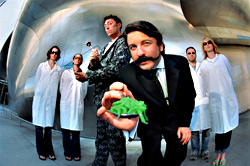With the deceptively simply named Dinner Theater, Matthew Richter has created something unique, perhaps even revolutionary, in the local theater scene. Richter, founder of Consolidated Works and a longtime innovator in the Seattle arts world, combines the concept of a futuristic feast with a speculative mock commentary on art, history, and evolution to concoct a brilliant sci-fi investigation of the cultural importance of food.
The show takes the form of a presentation to the enigmatic Board of Directors (the audience, limited to 40 members) in the year 2537, a time when the mass distribution of chemically processed food has all but destroyed not only culinary expertise but the raw products of agriculture and husbandry itself. Acting as the presenter, Richter—in a long black coat, with a Lemmy-like mustache connecting his sideburns—takes the Board on a philosophical tour of culinary history, starting in the sixth millennium B.C., complete with intermittent examples and taste tests. The atmosphere of the show resides somewhere between Star Trek and a graduate seminar in art history, though the event’s headier moments are leavened by a sharp sense of satire and plenty of tongue-in-cheek humor. Like all good science fiction, Dinner Theater uses the conceit of a speculative future to slyly critique contemporary trends: in this case, everything from consumerist amnesia to the mass replication of art to the centrality of food in creating a sense of belonging, whether to the tribe or the world at large.
Dinner Theater takes the concept of audience participation to its logical end. After a cabaret-style musical prologue in the lobby performed by Sarah Rudinoff and Rob Witmer, the audience is led into the theater proper, where it confronts a dark room closed off by a giant curtain. After a moment, Richter enters, wearing a headset, and addresses the Board of Directors: After years of deep research, he explains, his team of historians and scientists is ready to answer the five- syllable question the Board put to them. The answer may repulse you, he warns, but it is a valid answer—what’s more, it is the one valid answer. The Board is then led past the curtain into a room with dining tables set in a large inward-facing circle; in the center is a table with various artifacts, and at the top of the circle, Richter’s assistant, played by Jodi-Paul Wooster, stands in front of a transparent, high-tech podium.
Things have been interesting so far, but here’s where the show really takes off: Starting in prehistory with the “Alida Hunting Cup,” Richter leads the Board through a brief culinary history, complete with slides, movies, artifacts, and edible re-creations (the Alida Cup’s contents, for example, include sturgeon, lentils, pomegranates, and a quail egg). The quality of the food runs from good to quite tasty, and the presentations are always ingenious and pretty to look at—especially fascinating are the Corinthian Column and the 53 Stations of the Takaido. And the nitrous caper is hilarious (be sure to volunteer for that one).
Richter, who has assembled a fantastic staff for this show, obviously has great fun leading the audience through this semi-fictitious history of food. Beyond the entertainment, however, Dinner Theater carries a very real warning about the state of cuisine in the modern world. Channeling both literary critic Walter Benjamin and French poststructuralism, Richter equates mass-produced food to mass-produced art, the concern being that endless replication—whether the mechanical reproduction of works of art or the quick fix of fast food—creates a world overrun by mediocrity and homogeneity. In the end, despite the science-fiction conceit, this show, at its core, is a simple celebration of food in all its idiosyncratic, artisanal glory.








